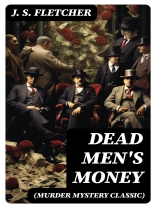In ‘Dead Men’s Money, ‘ J. S. Fletcher masterfully weaves a complex narrative that intricately examines the themes of greed, betrayal, and justice in a murder mystery setting. Set against the backdrop of early 20th-century England, Fletcher employs a gripping, suspenseful prose style that emphasizes keen psychological insight and meticulous plotting. The book reflects the characteristics of the golden age of detective fiction, embodying elements of classic whodunits while introducing nuanced character studies that elevate its plot beyond mere puzzle-solving. J. S. Fletcher, a prolific writer and journalist, was deeply embedded in the world of crime literature, drawing on his extensive background in journalism to inform his storytelling. His experiences likely honed his ability to create compelling narratives filled with suspense and moral ambiguity. This endeavor was part of Fletcher’s commitment to exploring the human condition through the lens of crime, making him a significant figure in the development of early mystery literature. ‘Dead Men’s Money’ is a must-read for enthusiasts of classic murder mysteries and those interested in the evolution of crime fiction. Fletcher’s expertly rendered characters and sophisticated deductions make this novel both a thrilling page-turner and a profound examination of moral dilemmas, appealing to scholars and casual readers alike.
Circa l’autore
J. S. Fletcher, born Joseph Smith Fletcher in 1865 in Yorkshire, England, remains an eminent figure in early 20th-century literature, particularly within the genre of detective fiction. A versatile writer, Fletcher initially embarked on a journalistic career before turning to writing fiction, where he gained significant acclaim. He penned more than 100 books across various genres, though he is most renowned for his detective novels, significantly contributing to the development of the mystery narrative structure during the Golden Age of Detective Fiction. ‘Dead Men’s Money’ stands as a quintessential example of Fletcher’s literary prowess, showcasing his skill in crafting engaging murder mysteries that captivate readers with their intricate plots and rich characterizations. His work is characterized by its vivid descriptions of rural English landscapes and society, an influence of his Yorkshire background. Fletcher’s distinct blend of suspense, meticulous attention to detail, and psychological depth in his characters has cemented his legacy in the annals of literary history. His contribution can be seen as a bridge between the sensational crime fiction of the Victorian era and the more methodical, clue-oriented detective stories that became popular in the 1920s and 1930s, making him an influential figure in the evolution of the mystery and detective genre.












